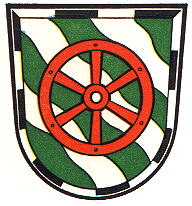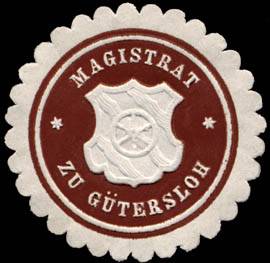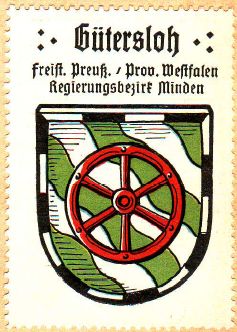Gütersloh: Difference between revisions
Knorrepoes (talk | contribs) m (added Category:Wiedenbrück using HotCat) |
Knorrepoes (talk | contribs) m (Text replace - "|width="15%"|50 px|right |}" to "|width="15%"|50 px|right |}<seo title="Wappen, Gemeindewappen" />") |
||
| Line 3: | Line 3: | ||
|width="70%" align="center" |'''Heraldry of the World<br/>Civic heraldry of [[Germany]] - [[Deutsche Wappen|Deutsche Wappen (Gemeindewappen/Kreiswappen)]]''' | |width="70%" align="center" |'''Heraldry of the World<br/>Civic heraldry of [[Germany]] - [[Deutsche Wappen|Deutsche Wappen (Gemeindewappen/Kreiswappen)]]''' | ||
|width="15%"|[[File:Germany.jpg|50 px|right]] | |width="15%"|[[File:Germany.jpg|50 px|right]] | ||
|} | |}<seo title="Wappen, Gemeindewappen" /> | ||
Revision as of 17:25, 5 November 2012
| Heraldry of the World Civic heraldry of Germany - Deutsche Wappen (Gemeindewappen/Kreiswappen) |
GÜTERSLOH
State : Nordrhein-Westfalen
District (Kreis) : Gütersloh (until 1972 Wiedenbrück)
Additions : 1910 Gütersloh-Land, Kattenstroth-Spexard (partly); 1970 Amt Avenwedde, Amt Brackwede (partly), Avenwedde, Ebbesloh, Friedrichsdorf, Hollen, Isselhorst, Niehorst, Spexard
Official blazon
In grünem Schilde, der von einem sechzehnmal schwarz-silbern gestückten Schildrand eingefasst ist, drei silberne Wellenschrägbalken, belegt mit einem sechsspeichigen roten Rad.
Origin/meaning
The arms were granted on January 12, 1844, after the village was granted town rights in 1825.
The bordure in Prussian colours symbolises the fact that the area became a possession of Prussia in 1814, only few Prussian towns were allowed to use the bordure. The wheel is taken from the arms of the Bishops of Osnabrück, who owned the area until 1565. The main green colour stands for agriculture, the waves symbolise the Dalke, Wapel and Ems rivers.
| Seal from around 1900 |
The arms in the Kaffee Hag albums +/- 1925 |
Literature : Stadler, K. : Deutsche Wappen - Bundesrepublik Deutschland. Angelsachsen Verlag, 1964-1971, 8 volumes.



